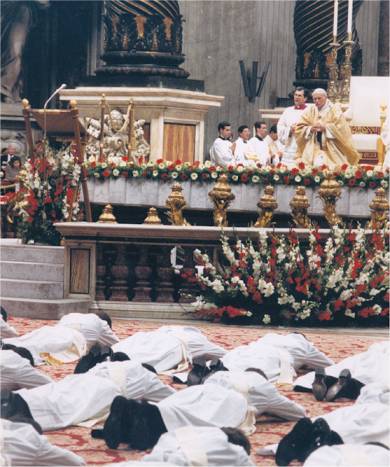The second shift due to contraception is buried more deeply within the observable societal changes. We have experienced a radical change in the deeper understanding and expectations of marriage. Before the sexual revolution, a young Catholic boy or girl experienced a family context in which being a husband or wife, father or mother, would have demanded a natural kind of self sacrifice.
In most families, the man would have worked hard to support a wife and many children, and the woman would have given her life in bringing up a large family. Both the man and woman were expected to lay down their lives in a vocation of self-sacrifice, and the Catholic young man or woman would have accepted this vocation within marriage as the norm.
It was within this context of self-sacrificial family life that a young man or woman’s vocation to the priesthood or religious life would have been formed. The young person therefore did not question the demand for a life of self-sacrifice; it was assumed that this was the foundation of a good life. The question, then, was which manner of sacrifice is best for the individual: Dying to self through marriage and family, or dying to self through a religious vocation?
Now, because of artificial contraception, the whole underlying assumptions and expectations about marriage have shifted. Marriage is no longer a way to give all, but a way to have it all. Therefore, when a young person today considers a religious vocation, they are not choosing between different paths of self-sacrifice; they are choosing between a life that seems to have it all and a life that seems to have nothing. They must choose between a home in the suburbs, 2.5 nice children, and a double income or total self denial. The choice is between a familiar form of hedonism or an inexplicable form of heroism
Monday, June 6, 2011
Contraception and Vocations
My friend Emily BizNet (theology of the Body Educator at Ruah Woods) points from her blog to a post by Fr. Dwight Longenecker about the impact that the contraceptive culture has on vocations to the priesthood and religious life. A snippet of Fr. Longenecker's article:
Subscribe to:
Post Comments (Atom)










1 comment:
This is a great insight. My husband and I often comment about how few of the people we went to college with have children at all. Their lives are oriented to what they want to do and to have. (I am not talking about people who married late, or people who want children but are infertile -- but the large number of people we know, married or unmarried, who have deliberately chosen not to have children). We are not taught to think of sacrificing anything. Two college friends of mine recently posted the same link on facebook about five things dying people supposedly regret most. Four of them are about not doing more for themselves, as if anyone today is pressured to sacrifice too much for others!
Post a Comment